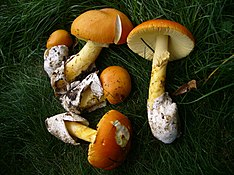Amanita caesarea
| Amanita caesarea | |
|---|---|
 |
|
| Scientific classification | |
| Kingdom: | Fungi |
| Division: | Basidiomycota |
| Class: | Agaricomycetes |
| Order: | Agaricales |
| Family: | Amanitaceae |
| Genus: | Amanita |
| Species: | A. caesarea |
| Binomial name | |
|
Amanita caesarea (Scop.) Pers. (1801) |
|
| Synonyms | |
|
|
| Amanita caesarea | |
|---|---|
| Mycological characteristics | |
| gills on hymenium | |
| cap is convex | |
| hymenium is free | |
| stipe has a ring and volva | |
| spore print is white | |
| ecology is mycorrhizal | |
|
|
edibility: choice but not recommended |
edibility: choice
Amanita caesarea, commonly known in English as Caesar's mushroom, is a highly regarded edible mushroom in the genus Amanita, native to southern Europe and North Africa. This mushroom can also be found in La Esperanza, Intibuca, Honduras, where a festival is celebrated annually in its honor. While it was first described by Giovanni Antonio Scopoli in 1772, this mushroom was a known favorite of early rulers of the Roman Empire.
It has a distinctive orange cap, yellow gills and stipe. Organic acids have been isolated from this species. Similar orange-capped species occur in North America and India. It was known to and valued by the Ancient Romans, who called it Boletus, a name now applied to a very different type of fungus.
Amanita caesarea was first described by Italian mycologist Giovanni Antonio Scopoli in 1772 as Agaricus caesareus, before later being placed in Amanita by Persoon in 1801. The common name comes from its being a favourite of the Roman emperors, who took the name Caesar (originally a family name) as a title. It was a personal favorite of Roman emperor Claudius. The Romans called it Bōlētus, derived from the Ancient Greek βωλιτης for this fungus as named by Galen. Several modern common names recognise this heritage with the English Caesar's mushroom and royal amanita, French impériale, Polish cesarski and German Kaiserling. In Italian, it is ovolo (pl. ovoli), due to its resemblance to an egg when very young. In Albanian it is kuqëlorja from its colour (< Albanian kuqe 'red'). Other common names include Amanite des Césars and Oronge.
...
Wikipedia
